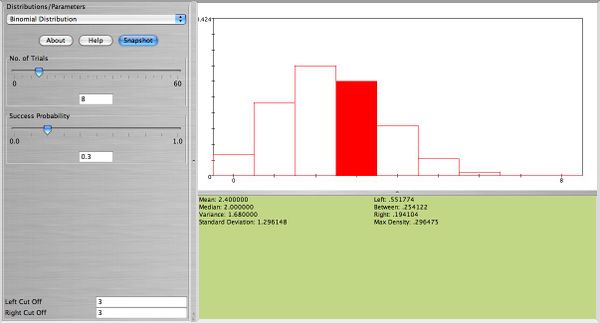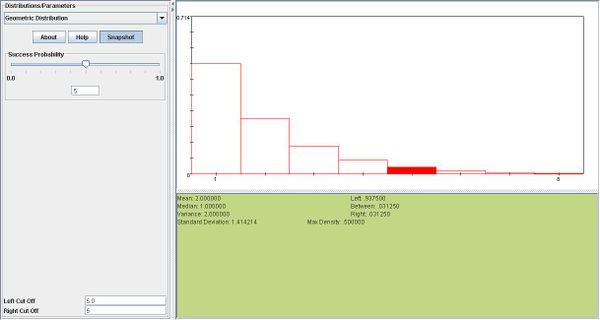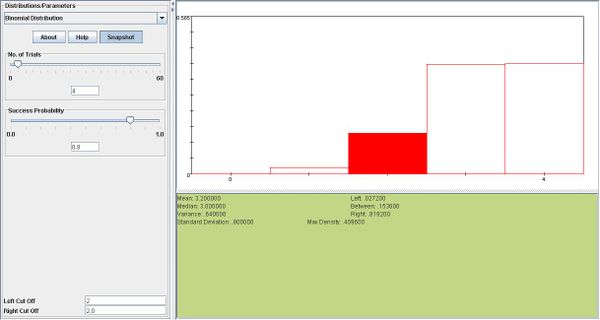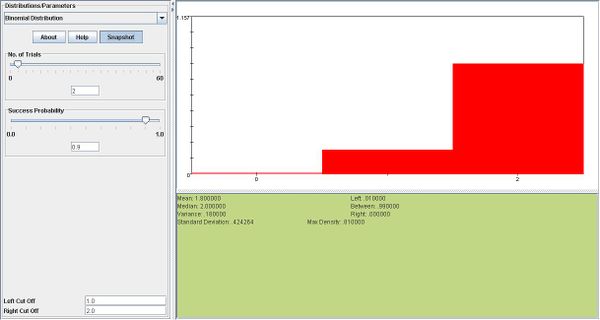Difference between revisions of "SOCR EduMaterials Activities Discrete Probability examples"
Create90215 (talk | contribs) |
Create90215 (talk | contribs) |
||
| Line 37: | Line 37: | ||
0.001= 0.1^n | 0.001= 0.1^n | ||
n= 3.</math> | n= 3.</math> | ||
| − | *In the first snapshot below, <math>n=2, | + | *In the first snapshot below, where<math>n=2, P(X\ge1)=0.99,</math> which is too small. In the second snapshot, we can see that when n is increased to 3, <math>P(X\ge1)</math> increases to nearly 1. </math> |
<center>[[Image: SOCR_Activities_Binomial_Christou_example6_b_n=2.jpg|600px]]</center> | <center>[[Image: SOCR_Activities_Binomial_Christou_example6_b_n=2.jpg|600px]]</center> | ||
<center>[[Image: SOCR_Activities_Binomial_Christou_example6_b_n=3.jpg|600px]]</center> | <center>[[Image: SOCR_Activities_Binomial_Christou_example6_b_n=3.jpg|600px]]</center> | ||
* '''Example 7:''' | * '''Example 7:''' | ||
Revision as of 10:44, 26 April 2007
- Description: You can access the applets for the distributions at http://www.socr.ucla.edu/htmls/SOCR_Distributions.html .
- Example 1:
Find the probability that 3 out of 8 plants will survive a frost, given that any such plant will survive a frost with probability of 0.30. Also, find the probability that at least 1 out of 8 will survive a frost. What is the expected value and standard deviation of the number of plants that survive the frost?
- Answer:
- \( X \sim b(8,0.3) \), \( P(X=3)= {8 \choose 3} 0.3^30.7^5=0.2541\)
- \( P(X \ge 1)=1-P(X=0)=1-.7^8=0.942\)
- \( E(X) = np = 8 \times 0.3=2.4 \)
- \( Sd(X)= \sqrt{npq}=\sqrt{8\times 0.30 \times 0.70}=1.3\)
Below you can see SOCR snapshots for this example:


- Example 2:
If the probabilities of having a male or female offspring are both 0.50, find the probability that a familiy's fifth child is their first son.
- Answer:
- \(P(X=5)= 0.50^5=0.03125\)

- Example 3:
- a. \(X \sim b(4,0.8) \), \( P(X=2)= {4 \choose 2} 0.8^2 0.2^2=0.1536\)

- b. \(P(X\ge 2)= {4 \choose 2} 0.8^2 0.2^2+{4 \choose 3} 0.8^3 0.2^1+{4 \choose 4} 0.8^4=0.9728\)

- Example 4:
- \(P(X=5)=0.7^4 0.3=0.07203\) where X represents the number of trials.

- Example 5:
\( E(X)=\frac{1}{p}=\frac{1}{0.30}=3.33\)
- Example 6:
- a. \(X \sim b(5,0.90). P(X=4)= {5 \choose 4} 0.9^4 0.1^1=0.32805\)

- \(P(X\ge 1)= 1-P(X=0)= 1- 0.1^4=0.9999\)

- b. \(P(X=0)=.001, 0.001= 0.1^n n= 3.\)
- In the first snapshot below, where\(n=2, P(X\ge1)=0.99,\) which is too small. In the second snapshot, we can see that when n is increased to 3, \(P(X\ge1)\) increases to nearly 1. </math>


- Example 7: